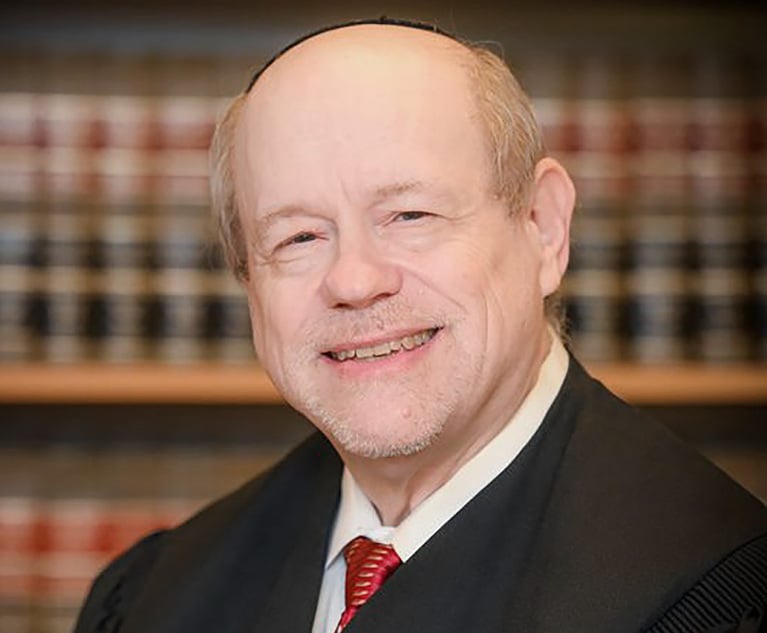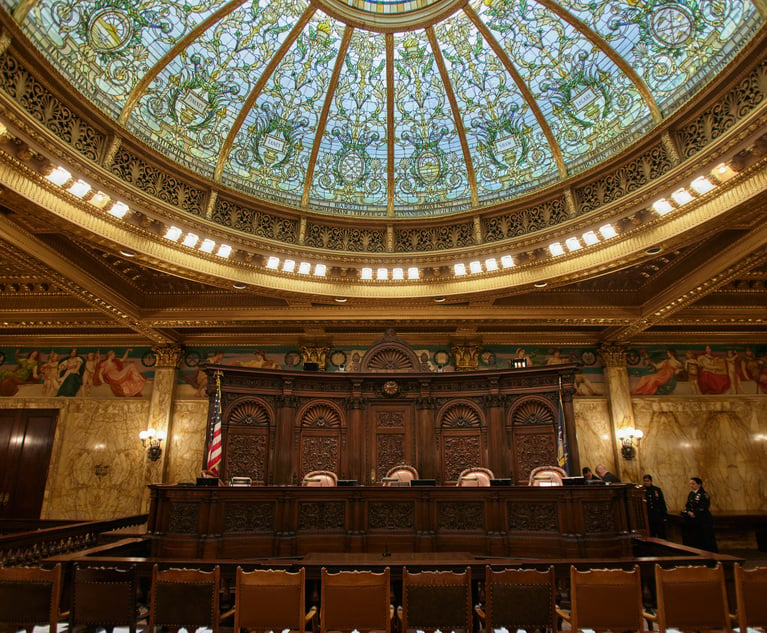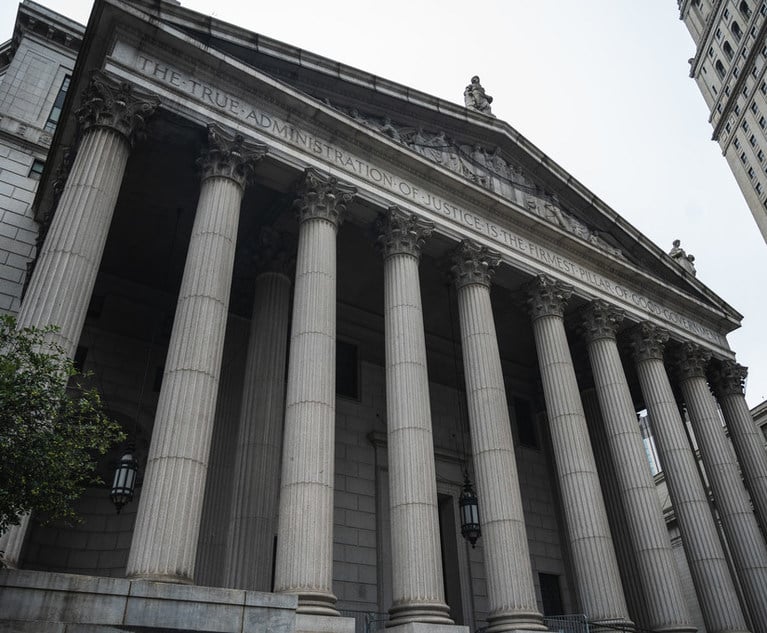'Liu v. SEC': A Decade of Issues
In this edition of his Corporate Securities column, John C. Coffee Jr. discusses the black letter rule that "restitution" sought the return of the plaintiffs' collective losses, while "disgorgement" required the defendants to return only their ill-gotten gains.
July 15, 2020 at 11:42 AM
11 minute read
 John C. Coffee Jr.
John C. Coffee Jr.
Back in the old days when law schools taught law, not political correctness, first-year students learned the black letter rule that "restitution" sought the return of the plaintiffs' collective losses, while "disgorgement" required the defendants to return only their ill-gotten gains. Knowledgeable professors would caution students that courts constantly conflated those two terms, using them interchangeably, but would insist that, properly understood, "restitution" covered all losses, and "disgorgement" only included the ill-gotten gains.
In Liu v. SEC, 2020 U.S. LEXIS 3374 (June 22, 2020), the Supreme Court, by an 8-1 majority, has proved us old timers right. And it has added some important qualifications: (1) the ill-gotten gains means the net gains (but only "legitimate expenses" need be deducted); (2) the recovery must be returned to the injured investors (and thus not transferred to the U.S. Treasury); and (3) there is no "joint and several liability," unless the parties were engaged in "concerted wrongdoing"—a phrase that would suggest conspiratorial liability, except for the fact that the Court carefully avoided using this phrase.
Although the Court seemingly endorsed these broad principles, it remanded to the Ninth Circuit to consider if there should be exceptions carved out. Before the Ninth Circuit on remand may be the question of whether the SEC can transfer the disgorgement it obtains to the Treasury if it is infeasible to identify and compensate the victims. In truth, because the victims are easily identifiable in Liu, and because a trustee seems intent on distributing the funds to them, there is little need to address this question, as the fund will be quickly exhausted. Still, if there is one Circuit that would be happy to offer its dicta, it would likely be the Ninth Circuit (whose record in the Supreme Court approaches the won/loss record of the old St. Louis Browns—millennials can look that up). More importantly, it might be foolish for the SEC to take this position because, as next discussed, they have more to gain than to lose by strictly complying with the Court's suggested position.
- Does Liu potentially overrule Kokesh?
In Kokesh v. SEC, 137 S. Ct. 1635 (2017), the Court held that disgorgement awarded in an SEC administrative action was a "penalty," and thus implied that the five-year statute of limitations under 26 U.S.C. § 2462 applied (which statute is applicable only to fines, penalties and forfeitures). This was a serious loss for the SEC because no statute of limitations applies to equitable relief, and the five-year rule of § 2462 is cutting off many potential cases.
But is disgorgement still a "penalty" after Liu? In Kokesh, the Court described disgorgement, as then used, as more punitive than compensatory in character and also saw it being primarily employed as a deterrent. But if after Liu, the defendant's "legitimate expenses" must be deducted, if the disgorgement goes only to victims of the crime, and if joint and several liability is ended (in most cases) so that only the person who received the ill-gotten gain is liable for its return, then disgorgement looks much more compensatory. "Equitable relief" is not intended to be punitive, and thus, if disgorgement is "equitable relief", and it seems more difficult to characterize it as a penalty.
Sooner or later, the SEC has to make this argument. Will it work? Although it is a logical position, this Court does not reverse itself easily (as it showed when it recently refused in Halliburton Co. v. Erica P. John Fund, Inc., 134 S. Ct. 2398 (2014), to reverse Basic, Inc. v. Levinson, 485 U.S. 223 (1988)). Stare decisis could win in the end, but in the meantime, the Commission would be foolish to hurt its non-trivial chances of reversing Kokesh by paying disgorgement funds it receives to the U.S. Treasury or seeking to impose anything close to "joint and several" liability. Because there is no statute of limitations on equitable relief, the SEC could in theory recover disgorgement any time it could show it was entitled to an injunction—a major victory.
- Can Tippers Be Held Liable for the Tippee's Gains?
Traditionally, the SEC requires a tipper to "disgorge" the tippee's gain in an insider trading case. After Liu, it seemingly must show that the tipper was engaged in "concerted wrongdoing" with the tippee. If so, then arguably both are liable for the tippee's gains under Liu, but in cases involving remote tippees, the tipper may be safe from disgorgement.
But, there are nuances here. Under Dirks v. SEC, 463 U.S. 646 (1983), if an insider tips a friend or relative, this is regarded as a "gift" of information by the insider/tipper to his tippee and is viewed as if the tipper traded and passed on the proceeds to his friend or relative as a gift. Id. at 664. If we see the profit as truly realized first by the tipper, then it follows that he should be required to disgorge his ill-gotten gain. But this is a very constructive theory, arguably adopted by the Court to preclude CEOs from tipping their wives and relatives with impunity. Whether courts will follow "gift theory" when it comes to determining who owes disgorgement remains to be seen. This battle is inevitable.
- Some Clear Violations of Law Will Not Produce "Ill-Gotten Gains" that Can Be Disgorged
The federal securities laws seek to protect persons other than investors. The clearest example may be the Foreign Corrupt Practices Act, which broadly prohibits payments to foreign officials or political parties for the purposes of obtaining or retaining business—largely for the purpose of protecting U.S. foreign policy from scandals. Suppose the CEO of XYZ approves a $10 million bribe to the Defense Minister of Nowhereland in order to win a $10 billion contract for its new jet fighter. No short-run impact on XYZ's stock price is evident, and the CEO did not receive any special bonus (but does hold significant stock options). Arguably, the bribe may even have resulted in a large profit. Although there are criminal penalties potentially available, it is not clear that there is any ill-gotten gain here to be disgorged by the CEO. Even a bonus awarded by the board is not easily characterized as an ill-gotten gain without evidence strongly linking the bonus to the bribe. Conceivably, the CEO could be said to have engaged in "concerted wrongdoing" with XYZ, and so arguably should be liable for XYZ's gains. But these gains were also shared with the stockholders. Not only is this a novel theory, but normally an officer cannot conspire with the corporation that employs him. A derivative suit can seek to hold the officer liable for any criminal penalties imposed on his corporation, but the SEC does not seem to have any equitable remedy available here.
In other, more traditional cases, the violation of a prophylactic rule may still not produce a gain to the company, even if it does produce losses to some investors. The Williams Act has an All Holders Rule (Rule 14d-10(a)(1)) and a Best Price Rule (Rule 14d-10(a)(2)). Let's suppose a bidder seeks to acquire 40% of the target's stock and solicits some 35 institutional investors, offering all the same price (except a large asset manager known as "Black Pebble," to whom it agrees to pay $2 more a share). Investors who received the lower price assert this was an unconventional tender offer that violated the Best Price Rule, and investors who received no offer at all claim that this alleged tender offer violated the All Holders Rule. The alleged losses may come to $1 billion or more. But if the aggrieved plaintiffs seek to sue based on a private cause of action for damages, they will likely run into the problem that there is generally no private cause of action for damages under the Williams Act. See Alexander v. Sandoval, 532 U.S. 275 (2001). Thus, their hope is that the SEC will sue and force disgorgement.
But even if rules have been violated, has the defendant received any ill-gotten gain here? Plaintiffs may understandably feel that they were damaged by the failure to pay them a higher price (or extend the tender offer to them), but that was not a gain in the sense that the defendant received any identifiable funds or property that it can disgorge. Nor would the tax laws see any gain on these facts. At most, the SEC might seek an injunction against the consummation of the tender offer, but not disgorgement.
- Suppose the Investor Losses Exceed the Gain Disgorged by the Defendant by Over a 100 to 1 Margin. In Such a Case, May the SEC Pay this Amount to the Treasury?
This will not be an uncommon case. For example, in an insider trading case, the SEC can seek a penalty of up to three times the gain or loss averted under Section 21A of the 1934 Act and it can also seek disgorgement. Also, investors can bring a private cause of action under Section 20A of the 1934 Act (but they seldom do because the damages are too modest).
Next, suppose the amount so disgorged is only $50,000. Must the Commission try and prorate this amount among the 25,000 investors who traded "contemporaneously" in the opposite direction to the defendant? Or can they just turn this amount over to the Treasury?
The problem with the SEC taking the easier course is that it makes the disgorgement look more like a penalty (and hence subject to the five-year statute of limitations). So what is a reasonable alternative? The SEC could establish an Investors Compensation Fund and give investors a period of time to file their claim for their share of the $50,000 amount disgorged. Few would file because the likely recovery seems too small to interest most investors. But after some period (say, a year), the balance on this small fund could become part of a broader investor compensation fund covering victims of all securities frauds where the SEC has recovered disgorgement that went unclaimed. Over time, numerous small recoveries, such as this one, would build up and enable the SEC able to pay investors some recovery in many cases where they could not today. Sharing the recovery among investors in this fashion is the pursuit of compensation and is fully consistent with the nature of an equitable remedy. In many frauds, there is no recovery because the defendants either disappear or are bankrupt; thus, amounts not claimed in other cases could go to their benefit. Defendants will dispute whether the SEC should play Santa Claus in this fashion, but no identifiable person benefits much when the $50,000 disappears into the U.S. Treasury.
Defendants will raise other issues: for example, can disgorgement be awarded in a case where the SEC is not required to prove scienter (such as Section 17 of the 1933 Act). Does mere negligence give rise to a truly "ill-gotten" gain? This may depend on whether disgorgement continues to be considered a "penalty". If it is a "penalty", then such an award may be inappropriate if the SEC alleges only negligence. Conversely, if the SEC can consider disgorgement to be only an "equitable remedy", then it seems appropriate in a "scienter-less" case to order that injured investors be compensated by a return of the gain. Even in these cases, however, the gain may be infeasible to calculate. Take for example a "books and records" case under §13 of the 1934 Act. What gain does the defendant realize because it maintained its books and records on an inadequate basis? These and other issues will keep courts and commentators busy for possibly a decade. The Ninth Circuit may soon have the first word on these questions, but it will hardly be the last word.
John C. Coffee Jr. is the Adolf A. Berle Professor of Law at Columbia University Law School and Director of its Center on Corporate Governance.
This content has been archived. It is available through our partners, LexisNexis® and Bloomberg Law.
To view this content, please continue to their sites.
Not a Lexis Subscriber?
Subscribe Now
Not a Bloomberg Law Subscriber?
Subscribe Now
NOT FOR REPRINT
© 2025 ALM Global, LLC, All Rights Reserved. Request academic re-use from www.copyright.com. All other uses, submit a request to [email protected]. For more information visit Asset & Logo Licensing.
You Might Like
View All
Decision of the Day: Judge Sanctions Attorney for 'Frivolously' Claiming All Nine Personal Injury Categories in Motor Vehicle Case


Decision of the Day: Trial Court's Sidestep of 'Batson' Deprived Defendant of Challenge to Jury Discrimination

Decision of the Day: Commercial Division Finds Defendant Engaged in Unfair Competition Against Plaintiff
Trending Stories
- 1Leaning Into ‘Core’ Strengths, Jenner’s Revenue Climbs 17%, Profits Soar 23%
- 2Frito Lays Could Face Liability for Customer's Grocery Store Fall Over Pallet Guard, Judge Rules
- 3Holland & Knight Expands Corporate Practice in Texas With Former Greenberg Traurig Partner
- 4Heir Cut: Florida Appellate Court Backs Garth Reeves' Will
- 5Class Action Allowed to Move Forward Against Philadelphia's 'Courtesy Towing' Program, Judge Rules
Who Got The Work
J. Brugh Lower of Gibbons has entered an appearance for industrial equipment supplier Devco Corporation in a pending trademark infringement lawsuit. The suit, accusing the defendant of selling knock-off Graco products, was filed Dec. 18 in New Jersey District Court by Rivkin Radler on behalf of Graco Inc. and Graco Minnesota. The case, assigned to U.S. District Judge Zahid N. Quraishi, is 3:24-cv-11294, Graco Inc. et al v. Devco Corporation.
Who Got The Work
Rebecca Maller-Stein and Kent A. Yalowitz of Arnold & Porter Kaye Scholer have entered their appearances for Hanaco Venture Capital and its executives, Lior Prosor and David Frankel, in a pending securities lawsuit. The action, filed on Dec. 24 in New York Southern District Court by Zell, Aron & Co. on behalf of Goldeneye Advisors, accuses the defendants of negligently and fraudulently managing the plaintiff's $1 million investment. The case, assigned to U.S. District Judge Vernon S. Broderick, is 1:24-cv-09918, Goldeneye Advisors, LLC v. Hanaco Venture Capital, Ltd. et al.
Who Got The Work
Attorneys from A&O Shearman has stepped in as defense counsel for Toronto-Dominion Bank and other defendants in a pending securities class action. The suit, filed Dec. 11 in New York Southern District Court by Bleichmar Fonti & Auld, accuses the defendants of concealing the bank's 'pervasive' deficiencies in regards to its compliance with the Bank Secrecy Act and the quality of its anti-money laundering controls. The case, assigned to U.S. District Judge Arun Subramanian, is 1:24-cv-09445, Gonzalez v. The Toronto-Dominion Bank et al.
Who Got The Work
Crown Castle International, a Pennsylvania company providing shared communications infrastructure, has turned to Luke D. Wolf of Gordon Rees Scully Mansukhani to fend off a pending breach-of-contract lawsuit. The court action, filed Nov. 25 in Michigan Eastern District Court by Hooper Hathaway PC on behalf of The Town Residences LLC, accuses Crown Castle of failing to transfer approximately $30,000 in utility payments from T-Mobile in breach of a roof-top lease and assignment agreement. The case, assigned to U.S. District Judge Susan K. Declercq, is 2:24-cv-13131, The Town Residences LLC v. T-Mobile US, Inc. et al.
Who Got The Work
Wilfred P. Coronato and Daniel M. Schwartz of McCarter & English have stepped in as defense counsel to Electrolux Home Products Inc. in a pending product liability lawsuit. The court action, filed Nov. 26 in New York Eastern District Court by Poulos Lopiccolo PC and Nagel Rice LLP on behalf of David Stern, alleges that the defendant's refrigerators’ drawers and shelving repeatedly break and fall apart within months after purchase. The case, assigned to U.S. District Judge Joan M. Azrack, is 2:24-cv-08204, Stern v. Electrolux Home Products, Inc.
Featured Firms
Law Offices of Gary Martin Hays & Associates, P.C.
(470) 294-1674
Law Offices of Mark E. Salomone
(857) 444-6468
Smith & Hassler
(713) 739-1250






